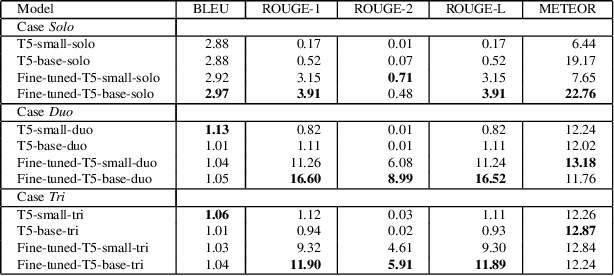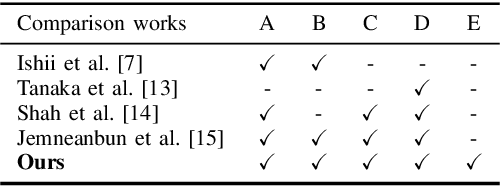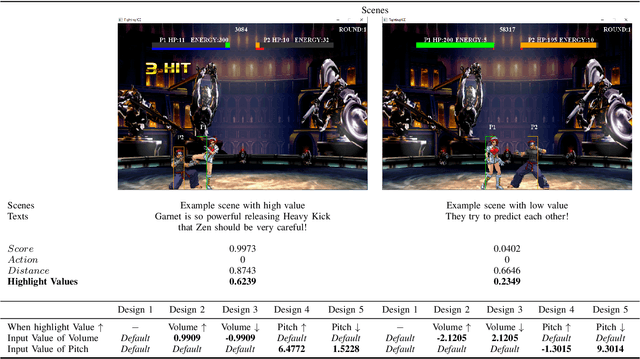Junjie H. Xu
An Comparative Analysis about KYC on a Recommendation System Toward Agentic Recommendation System
Dec 30, 2025Abstract:This research presents a cutting-edge recommendation system utilizing agentic AI for KYC (Know Your Customer in the financial domain), and its evaluation across five distinct content verticals: Advertising (Ad), News, Gossip, Sharing (User-Generated Content), and Technology (Tech). The study compares the performance of four experimental groups, grouping by the intense usage of KYC, benchmarking them against the Normalized Discounted Cumulative Gain (nDCG) metric at truncation levels of $k=1$, $k=3$, and $k=5$. By synthesizing experimental data with theoretical frameworks and industry benchmarks from platforms such as Baidu and Xiaohongshu, this research provides insight by showing experimental results for engineering a large-scale agentic recommendation system.
CS-lol: a Dataset of Viewer Comment with Scene in E-sports Live-streaming
Jan 17, 2023



Abstract:Billions of live-streaming viewers share their opinions on scenes they are watching in real-time and interact with the event, commentators as well as other viewers via text comments. Thus, there is necessary to explore viewers' comments with scenes in E-sport live-streaming events. In this paper, we developed CS-lol, a new large-scale dataset containing comments from viewers paired with descriptions of game scenes in E-sports live-streaming. Moreover, we propose a task, namely viewer comment retrieval, to retrieve the viewer comments for the scene of the live-streaming event. Results on a series of baseline retrieval methods derived from typical IR evaluation methods show our task as a challenging task. Finally, we release CS-lol and baseline implementation to the research community as a resource.
Sentence Punctuation for Collaborative Commentary Generation in Esports Live-Streaming
Oct 24, 2021

Abstract:To solve the existing sentence punctuation problem for collaborative commentary generation in Esports live-streaming, this paper presents two strategies for sentence punctuation for text sequences of game commentary, that is, punctuating sentences by two or three text sequence(s) originally punctuated by Youtube to obtain a complete sentence of commentary. We conducted comparative experiments utilizing and fine-tuning a state-of-the-art pre-trained generative language model among two strategies and the baseline to generate collaborative commentary. Both objective evaluations by automatic metrics and subjective analyses showed that our strategy of punctuating sentences by two text sequences outperformed the baseline.
Fighting Game Commentator with Pitch and Loudness Adjustment Utilizing Highlight Cues
Aug 18, 2021



Abstract:This paper presents a commentator for providing real-time game commentary in a fighting game. The commentary takes into account highlight cues, obtained by analyzing scenes during gameplay, as input to adjust the pitch and loudness of commentary to be spoken by using a Text-to-Speech (TTS) technology. We investigate different designs for pitch and loudness adjustment. The proposed AI consists of two parts: a dynamic adjuster for controlling pitch and loudness of the TTS and a real-time game commentary generator. We conduct a pilot study on a fighting game, and our result shows that by adjusting the loudness significantly according to the level of game highlight, the entertainment of the gameplay can be enhanced.
Table Caption Generation in Scholarly Documents Leveraging Pre-trained Language Models
Aug 18, 2021


Abstract:This paper addresses the problem of generating table captions for scholarly documents, which often require additional information outside the table. To this end, we propose a method of retrieving relevant sentences from the paper body, and feeding the table content as well as the retrieved sentences into pre-trained language models (e.g. T5 and GPT-2) for generating table captions. The contributions of this paper are: (1) discussion on the challenges in table captioning for scholarly documents; (2) development of a dataset DocBank-TB, which is publicly available; and (3) comparison of caption generation methods for scholarly documents with different strategies to retrieve relevant sentences from the paper body. Our experimental results showed that T5 is the better generation model for this task, as it outperformed GPT-2 in BLEU and METEOR implying that the generated text are clearer and more precise. Moreover, inputting relevant sentences matching the row header or whole table is effective.
 Add to Chrome
Add to Chrome Add to Firefox
Add to Firefox Add to Edge
Add to Edge